Our Costa Mesa Detox Center
Detox in Costa Mesa & Huntington Beach
The first step in treatment is called detox, or detoxification. Over time, the human body may have become dependent on drugs or alcohol, and medical intervention is necessary to help you battle your addictions. Without proper medical care at the time of detoxification, your withdrawals may be extremely dangerous.
Our Costa Mesa detox center assists people in cleansing their bodies of intoxicants as comfortably and safely as possible. Getting through detox then allows a patient to explore underlying issues.
What to expect:
Patients begin treatment at our detox program. During this time, there is a thorough assessment of a patient’s health. They are seen by both a medical doctor and a licensed psychiatrist who evaluate the patient’s history and assess withdrawal symptoms to create a tailored medical regime for the detoxification process.
While at this higher level of care, patients receive additional attention and supervision by the nursing and treatment team, especially during drug withdrawal. Groups and programming are available during the day; clients are encouraged to participate, but it is not required at this time.
8 Things to Know About Drug Withdrawal and Detox
Being armed with the knowledge of drug detoxification and the withdrawal process can help you be prepared to take the first step of getting sober.
Here are eight things to remember regarding drug and alcohol detox treatment:
1. Drug detox must be completed before moving on to drug rehab.
You must be free from all drug toxins in order to receive effective addiction treatment, which includes addiction treatment groups, therapy and counseling.
2. Detox is only one part of the recovery process.
Many believe that detox is all that’s required for recovery. This simply isn’t the case. Drug detox is just the first step in the ongoing process of breaking the cycle of drug addiction.
3. Detox is challenging.
Your body will crave the drug, and you will likely experience physical symptoms like headaches, nausea, chills and fever.
4. There is no set amount of time for detox.
Every individual is different when it comes to detox. For some, it takes two to three days to complete. For others, it can be up to a week or longer.
5. Your tolerance for the drug will increase if you return to it after detoxification.
Your dependence and craving for the drug will increase, too.
6. Your privacy is very important during detox.
You may exhibit behaviors that you don’t want to share with others. Within our detox program, you will be in a safe environment with experienced and dedicated staff members, most of whom are in recovery themselves, who will help you get through this transitional period.
7. You may need multiple attempts to successfully complete detox.
The process can be very difficult, and not everyone succeeds the first time. If you don’t make it through, don’t get discouraged. If you have made the commitment to seek recovery, you must attempt again until you can complete the process.
8. Detox requires medical supervision.
Withdrawal symptoms can be unpredictable. With medical supervision, you can feel confident that you’ll be safe even during the most difficult phases of detox. This will minimize the chance of complications while greatly reducing the risk of relapse.
Detox From Drugs & Alcohol in Costa Mesa
At Safe and Sound Treatment, we understand the challenges that detox can present. We work hard to create a personalized treatment plan for you. We have extensive experience working with individuals who are experiencing withdrawal symptoms, and we can help you be prepared for this first stage in your recovery.
This is a difficult but necessary process, and we are here to help you through it.
Find comfort and community at our Huntington Beach sober living homes, and get your professionally licensed treatment at our Detox Center in Costa Mesa.
When you’re ready, give us a call at (949) 763-5840. Or, you can use the contact form on this page, and we’ll contact you as soon as possible.
Contact Us Today
FAQ's
The first signs of withdrawal can vary depending on the substance from which an individual is detoxing, but generally include a combination of physical and psychological symptoms. Common early signs of withdrawal may include:
- Anxiety or nervousness
- Insomnia or disturbed sleep patterns
- Nausea or vomiting
- Sweating
- Increased heart rate
- Muscle aches or discomfort
- Irritability or mood swings
- Fatigue
The duration of withdrawal symptoms varies significantly depending on the type of substance used, the level of dependency, and the individual’s overall health. Generally, withdrawal symptoms can last from a few days to several weeks. For some substances, acute withdrawal symptoms may peak within the first 24 to 48 hours after cessation and gradually decrease over the course of one to two weeks. However, some individuals may experience prolonged withdrawal symptoms, known as Post-Acute Withdrawal Syndrome (PAWS), which can last for months or even years, albeit in a less intense form than the initial acute withdrawal phase.
After completing a medical drug detox program, the next step in the recovery process typically involves transitioning to a structured treatment program that addresses the psychological, social, and behavioral aspects of addiction. The type of program an individual enters depends on their specific needs, but may include:
- Residential or Inpatient Treatment: Provides intensive care and support in a live-in facility, where individuals can focus entirely on recovery without the distractions or triggers of their home environment.
- Intensive Outpatient Program (IOP): Offers a structured therapy program that allows individuals to live at home while attending treatment sessions several times a week.
- Outpatient Treatment Programs: Suitable for those with mild to moderate addiction issues, allowing individuals to attend therapy sessions while maintaining their daily responsibilities.
Drug detoxification at home can be highly dangerous due to several factors:
- Lack of Medical Supervision: Withdrawal symptoms can be severe and potentially life-threatening, requiring immediate medical intervention. Without professional supervision, there’s a high risk of complications.
- Risk of Relapse: The discomfort and intensity of withdrawal symptoms without professional support can lead to a high risk of relapse as a means to alleviate suffering.
- Mental Health Risks: Detox can trigger or exacerbate mental health issues such as anxiety, depression, or psychosis, which can lead to dangerous situations without proper care.
- Inadequate Medication Management: Medical detox often involves the use of medications to manage withdrawal symptoms safely. At home, individuals lack access to these medications and medical oversight, increasing the risk of complications.









